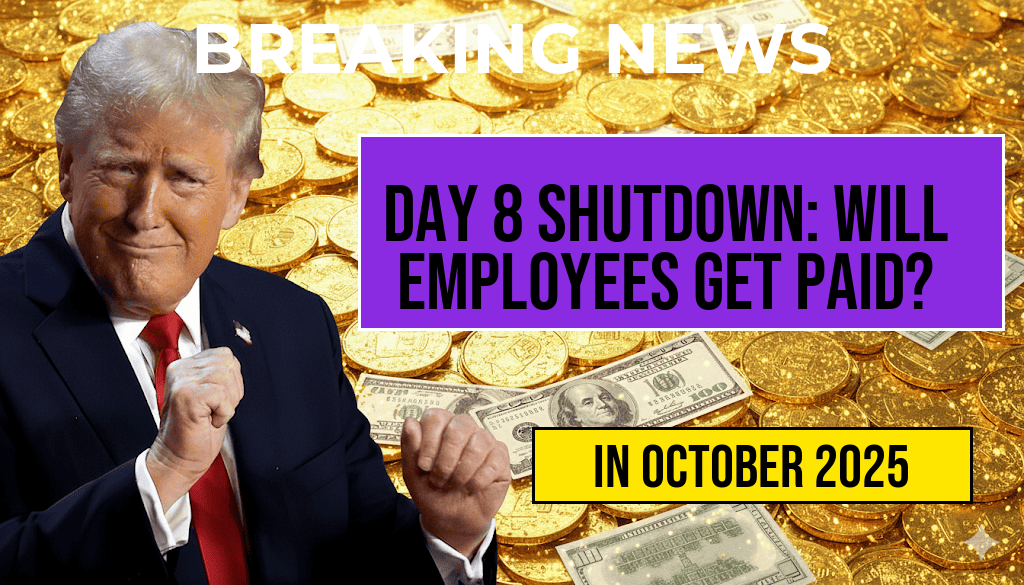As the federal government enters its eighth day of shutdown, thousands of federal employees remain uncertain about their financial futures. While some workers face unpaid leave, others are anxiously awaiting clarification on whether they will receive their full salaries or experience partial or no pay at all. The impasse, driven by Congressional disagreements over budget allocations and policy priorities, has disrupted numerous federal services and raised questions about the economic and emotional toll on those affected. With negotiations ongoing and little sign of immediate resolution, federal employees across various agencies are grappling with mounting financial stress, prompting urgent calls for bipartisan action to end the shutdown and restore stability.
Current Status of Federal Employee Compensation
As of day eight, the federal government remains partially closed, affecting an estimated 800,000 federal workers. While some have been furloughed without pay, certain essential personnel continue working under directives that often include provisions for back pay once funding resumes. However, the specifics of pay arrangements vary widely depending on agency classifications and the duration of the shutdown.
Furloughed Employees and Pay
- Most furloughed workers are temporarily sent home without pay until the government reopens.
- Historically, Congress has authorized retroactive pay for furloughed employees once funding is restored, but this process can take weeks or months to implement.
- Some employees, particularly in critical roles such as national security or public safety, continue working and are expected to receive their paychecks, albeit often delayed.
Employees Required to Work
- Employees deemed essential or “excepted” continue working during shutdowns, including TSA agents, border patrol officers, and certain health department personnel.
- Their pay is typically deferred until funding is approved, meaning paychecks may be delayed but not canceled.
- Federal agencies are required to prioritize operations, but the lack of appropriations hampers many services.
Legal and Political Developments
The ongoing shutdown stems from disputes over the federal budget, with Republicans and Democrats unable to reach a consensus on appropriations bills or policy riders. The Biden administration has emphasized the importance of keeping essential services running and ensuring workers are compensated, but legislative gridlock persists. According to Congress.gov, recent funding bills have failed to pass in the Senate, prolonging the shutdown.
Legal experts point out that federal employees are protected by laws that generally guarantee back pay after a shutdown ends, but the uncertainty surrounding the timing exacerbates financial hardship. The Government Accountability Office has noted that prolonged shutdowns can have lasting impacts on employee morale and agency operations.
Impacts on Federal Services and Public Trust
Beyond employee concerns, the shutdown affects a broad spectrum of federal services, including passport processing, visa applications, and regulatory inspections. Public confidence in government functions often diminishes during such periods, especially when services are delayed or halted entirely. Consumer protection agencies, environmental oversight, and research initiatives also face setbacks, compounding the economic and societal effects.
Economic Consequences
| Aspect | Effect |
|---|---|
| Federal Employee Income | Delayed or unpaid wages impacting household budgets |
| Government Contracting | Halted projects and delayed payments to contractors |
| Consumer Confidence | Reduced spending due to uncertainty |
| Overall GDP | Potential slowdown in economic growth |
Economists warn that prolonged shutdowns can ripple through the economy, reducing consumer spending and undermining investor confidence. The Congressional Budget Office estimates that each week of shutdowns can reduce GDP growth by a measurable amount, depending on the scope and duration.
What Comes Next?
As negotiations continue in Washington, federal employees and their families await clarity. Lawmakers face mounting pressure from union groups, advocacy organizations, and local governments demanding a swift resolution. Some officials suggest that bipartisan agreement on a temporary funding measure could end the shutdown, allowing employees to return to work and receive their owed compensation.
Meanwhile, federal agencies are preparing contingency plans to manage ongoing disruptions and communicate with employees about their rights and benefits. The Office of Personnel Management (OPM) has issued guidance emphasizing that employees will generally receive back pay once appropriations are enacted, but the delay remains a significant concern.
Resources for Federal Employees
- Federal Employee Pay Portal: https://fegov.officialpayments.com/
- OPM Shutdown Resources: https://www.opm.gov/closing/
- Union Support and Advocacy Groups
The situation remains fluid, with federal employees anxiously watching developments in Congress. As political leaders debate the path forward, the pressing question for many remains: will they receive their full pay, or face further financial hardship as the shutdown persists?
Frequently Asked Questions
Will federal employees receive their full pay on Day 8 of the shutdown?
Currently, federal employees are uncertain about receiving their full pay as the shutdown continues into Day 8. The situation depends on legislative decisions and potential emergency measures enacted by Congress.
What are the implications for federal employees if the shutdown persists?
If the shutdown persists, federal employees may face delayed or reduced payments, impacting their ability to meet financial obligations. Essential workers might continue working without immediate pay, while others could be furloughed.
Is there any legislation that guarantees back pay for federal workers after the shutdown ends?
Yes, historically, federal employees have received back pay once the shutdown concludes, but this depends on congressional approval and specific legislation enacted to cover the period of the shutdown.
How can federal employees prepare financially during this uncertain period?
Federal employees are advised to review their financial plans, prioritize essential expenses, and explore emergency savings or assistance programs to manage potential pay disruptions.
What is the current status of negotiations to end the shutdown?
The status of negotiations remains uncertain, with lawmakers debating funding bills and budget agreements. The outcome will determine whether the shutdown continues beyond Day 8 or if a resolution is reached to restore federal operations.






